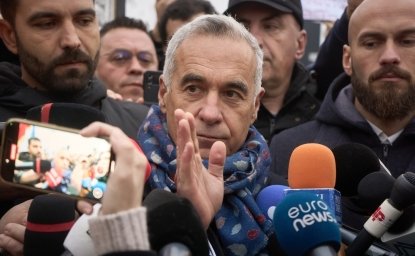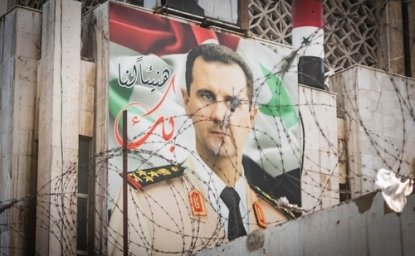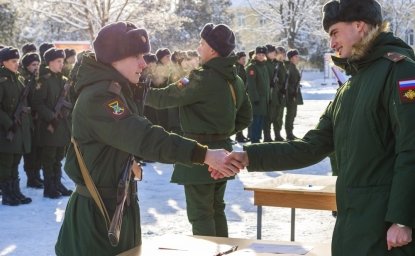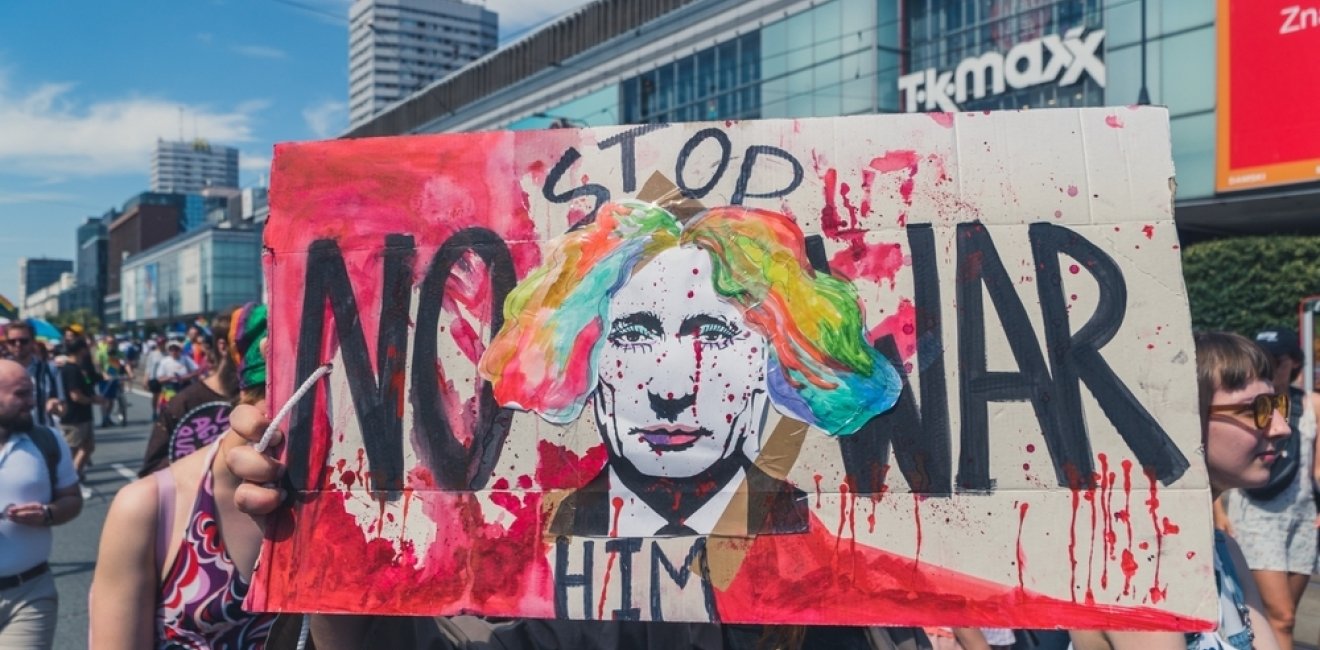
A blog of the Kennan Institute
April 2013: Almost ten years ago, in Amsterdam, while on a working visit, Vladimir Putin was asked about the homophobic legislation recently introduced in the Russian parliament, the so-called “gay propaganda law,” which would ban the “promotion of nontraditional sexual values”—that is, homosexuality—among Russian children. Putin argued that he cared about social peace. “I can hardly imagine gay marriage being allowed in Chechnya,” he said. “Can you imagine that? It would end up in murder.”
It did indeed end up in murder. In the spring of 2017, Novaya Gazeta reported on a series of persecutions of LGBT people in Chechnya: dozens of gay men were detained and tortured; some were killed. With respect to the LGBT community, already labeled as outcast by federal homophobic policy, Chechen government’s lawlessness and impunity knew no limits.
Back then, the Kremlin adopted the gay propaganda law in order to brand Putin as a conservative, but, more important, it was a political strategy. By 2013 the Bolotnaya protest movement, triggered by Putin’s return to his Kremlin throne, had largely been destroyed. But anti-Putin sentiment was still strong, and the Kremlin intentionally fueled a debate on a sensitive issue to divert attention from his persona. As Masha Plotko from the Levada Center observed then, “The state started to heavily promote ‘the fight against homosexual propaganda,’ thus channeling the political and social dissent.”
Now it’s time for a sequel. The Russian parliament is set to extend the controversial gay propaganda law. “Promotion of nontraditional sexual orientations” will be banned not only among children but for all ages. It will be prohibited across all Russian media. And the reason is largely the same: ten years ago, Putin weaponized the debate on LGBT when he was losing his war with public attitudes. Now he’s losing his war in Ukraine.
The first mass mobilization in Russia since World War II has brought the war in Ukraine to everyone’s doorstep. For Russians, it came as a shock. According to the Levada Center, in October the public mood responded to mobilization with the most significant downturn in recent history: stress, anxiety, and fear have increased. Yet more than 50 percent of the nation expressed support for mobilization, according to the sociological research project ExtremeScan. It’s a high figure, but these emotions do not conflict with each other, as they all are connected to the change in the perception of Putin’s war: Russia is not invading—that is, “liberating”—Ukraine; instead, Russia is itself under attack. The nation increasingly sees the war as a defensive military operation.
The Kremlin knows how to exploit and boost these emotions. Compared to language promulgated by the Kremlin at the start of the war, the official narrative has completely changed. This is no longer a "special military operation” aimed at the “denazification” of Ukraine; it is the Great Patriotic War 2.0, according to the military textbook for newly drafted men. Propaganda brands it a people’s war in which Russia’s very existence is at stake.
Anti-LGBT Legislation Supports Doomsday Narratives
And this is where the anti-LGBT legislation comes in handy. It helps to portray the invasion as a defensive war: no matter that it is Kyiv and Kharkiv that are under endless shelling and that television shows praise this campaign of terror on a daily basis. The West is destroying Russia from within with its liberal values. “A special military operation is taking place not only on the battlefields,” said the lawmaker Aleksandr Khinstein, who introduced the new anti-LGBT legislation draft, “but also in the consciousness of the people, in their minds and in their souls. Today, we are fighting so that in Russia instead of mom and dad there isn’t ‘parent No. 1,’ ‘parent No. 2,’ ‘parent no. 3.’”
The parent No.1–2–3 condemnation, already a meme across social networks in Russia, comes directly from Vladimir Putin. “‘Parent No. 1,’ ‘parent No. 2,’ ‘parent No. 3’ instead of mom and dad—did they go completely nuts down there [in the West]?,” he inquired rhetorically in a speech devoted to the annexation of the occupied territories of Ukraine. He went on: “The overthrow of faith and traditional values and the suppression of freedom are resembling a ‘religion in reverse’—pure Satanism.”
The sourer things turn on the battlefield, the more insistently the Kremlin portrays the war as an existential fight in which the stakes are the future of the whole world. It just happened that Russia found itself on the front line of the global war, launched against humanity by Western liberal elites. Rhetorically, this narrative turns increasingly sectarian as officials and propagandists emphasize the idea of the oncoming final battle between Good and Evil. It’s as if Russia’s leadership had morphed into a destructive cult, striving for the end of the existing world.
Dmitry Medvedev, the former president and one of the leading hawkish voices of this war, has streamlined this vision in his recent Telegram post. “Other states, raped by the lords of darkness, slaveowners, and oppressors, were awaiting our awakening,” he said. Medvedev anticipates the downfall of "the rotten world order” and sets the goal: “To stop the master of the underworld, whichever his name is—Satan, Lucifer, or Iblis.”
At first sight, Medvedev's statement looks like a Bolshevik manifesto of the early twentieth century or even a screed put out by a religious terrorist group. In fact, artificial in tone and substance, it looks more like a selection of lines from a Marvel movie: you might expect to hear these words coming from Bane’s mouth in the Dark Knight series.
Political Strategy or Fanaticism?
So what is it? Who rules Russia now? A rogue group of fanatics who actually believe in what they say and are preparing for Doomsday in their decisive mission to bring this baleful and filthy world to its end? Or a team of cynical and canny strategists who manipulate the agenda in order to hide defeat on the battlefield, feed on the nation’s fears and prejudices, and bluff people with their hysterical and apocalyptic story?
It can be both. Practically, the Kremlin’s political strategy proved to be effective. After Putin’s approval rating declined in September, when the mobilization was declared, it bounced back in October, even before the mobilization was officially announced complete and over. To a large extent, the surge in popularity was the product of propagandistic manipulations: the alarmist—and delusive—propaganda helps people come to terms with the extreme reality of the war and bolsters the urge to reunite under Putin’s leadership.
At the same time, Putin’s circle’s concept of the West’s evil plan to destroy Russia by demoralizing it with its cosmopolitan values is more than a political trick. It also posits a Western conspiracy that, along with similar ginned-up conspiracies, has long been shaping the Russian leadership’s worldview. It is explanatory not only as a propagandistic narrative; it is what Putin and his teammates want to believe because it reconciles them to the barbarity of their actions. Instead of being an aggressor who unleashed a senseless and bloody war out of an insane ambition and who is now losing that same war, isn’t it more soothing to think of oneself as waging an existential battle with a much more powerful enemy?
Postponing the Reckoning
The truth is, the longer the war goes on, the harder it is for Vladimir Putin to end it. As historian Lawrence Freedman has observed, any peace deal will be followed by a reckoning, and the consequences of Putin’s folly will be exposed. The war is more than just developments on the battlefield; it is a climate. It is the sense of being at war and the motherland imperiled, a sense the Kremlin propagates inside Russia with censorship and repression, partial martial law, introduced across the country, and homophobic legislation, aggressive propaganda, and Dmitry Medvedev’s cartoonish Telegram posts, among many examples.
For the Russian people, to end the war would mean to stop the stressful emotional run and finally take a breath. Then the questions would start popping up. What happened? What was it all about? What was it all for? Why did tens of thousands of people die? Why is the economy shattered? Why does Russia's future look doomed? To avoid answering any of these questions, Putin will keep fighting and impose on the nation more apocalyptic narratives, which in turn will set his own mind in a yet more fundamentalist, eschatological way.
The opinions expressed in this article are those solely of the author and do not reflect the views of the Kennan Institute.
Author

Russian Journalist and Filmmaker

Kennan Institute
The Kennan Institute is the premier US center for advanced research on Eurasia and the oldest and largest regional program at the Woodrow Wilson International Center for Scholars. The Kennan Institute is committed to improving American understanding of Russia, Ukraine, Central Asia, the South Caucasus, and the surrounding region though research and exchange. Read more

Explore More in The Russia File
Browse The Russia File
In Search of Russia’s Digital Trace in Romania’s Political Crisis

With Syria’s Collapse Russia’s Regional Power Play Disintegrates

Putin's Strategy Tests Europe's Defense Limits

